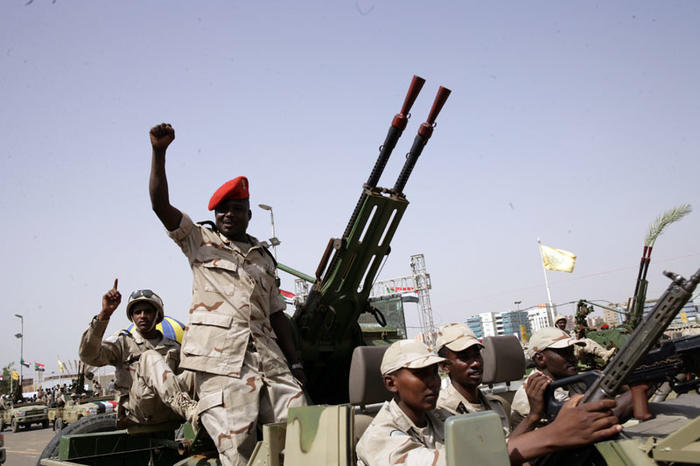‘SAF withdrawal from Darfur, Kordofan sites neither final victory nor decisive result’

RSF paramilitaries (File photo: SUNA)
The recent ‘fall’ of Sudan Armed Forces (SAF) garrisons in Darfur and Kordofan to the advancing Rapid Support Forces (RSF) is a tactical withdrawal, the result of the fragility of the Sudanese state, and an absence of army control, a Sudanese military expert has told Radio Dabanga.
In a live interview at the Radio Dabanga studios in Amsterdam, the Netherlands, Brig Gen (Retd) Abdelgadir Ismail El Samani, asserts that the area of influence of the RSF is only able to expand due to fragilities within the Sudanese government and the absence of army control, however “the fall of garrisons in Darfur [Nyala, Zalingei, and El Geneina] and Kordofan is neither a final victory nor a decisive result”.
He said that the SAF withdrawal from the military zones is a tactical manoeuvre, ordered by the hight command to avoid unnecessary losses, because of the intensity of fire and the sheer numbers of the attacking force.
“Unnecessarily sustaining heavy losses in the army could expose a commander to a Court Martial, even if he achieves victory. The objective not to control the sites, but to exploit success to achieve goals,” the General says.
He suggests that “the expansion of the RSF in Darfur and Kordofan is unlikely to be based on any political or strategic thinking, pointing out that “the RSF is made up of irregular elements, many of whom have not received formal military training.
Jeddah
El Samani does not expect the internationally brokered Jeddah negotiations to call a halt to the war. “Negotiations can only succeed once the hostilities have reached a critical point that demands that both parties explore the possibility of concessions to reach a middle point.”
Negotiations could only succeed if the RSF agrees to withdraw from residential neighbourhoods and homes to military camps, which could lead to an imbalance of power in favour of the army, El Samani says. “The RSF would only agree to a withdrawal from residential neighbourhoods if they gave up thinking about governing the country.”
He accused “certain regional actors” of supporting the RSF. If not for them, the war could have ended in six months, he says. He also does not rule out that the prolongation of the war period could be intended to weaken some parties and civilian groups, to allow other ideological parties to rule Sudan.
‘Humanitarian assistance’
The facilitators of the Jeddah negotiation platform have voiced ‘regret’ that the Sudan Armed Forces (SAF) and paramilitary Rapid Support Forces (RSF) have been unable to agree on the implementation of a ceasefire during the first round of talks that ended this week, however the facilitators confirm that “agreement has been reached on steps to facilitate increased humanitarian assistance and the implementation of confidence-building measures”. The UN Humanitarian Coordinator in Sudan said in a separate statement that these are “promises that must be kept.”
The RSF military actions in Darfur and Kordofan aim to expand their territorial control, enhancing their negotiation leverage in Jeddah, Lt Col (Retd) Omar Arbab told Radio Dabanga in an interview last week.
“Military escalation at the beginning of a negotiation is a strategy used to secure more territory for a ceasefire agreement”. Arbab pointed to the SAF spokesperson’s statement, where he emphasised that resuming negotiations in Jeddah does not signify a halt in fighting.











 and then
and then